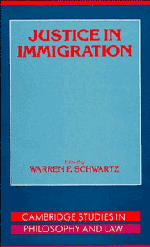Book contents
- Frontmatter
- Contents
- List of contributors
- 1 Immigration, welfare, and justice
- 2 Citizenship, the demands of justice, and the moral relevance of political borders
- 3 A two-country parable
- 4 Immigration, identity, and justice
- 5 Immigration, justice, and culture
- 6 Fear and loathing at the border
- 7 Immigration policy in liberal political theory
- 8 The welfare economics of immigration law: a theoretical survey with an analysis of U.S. policy
- 9 Just borders: normative economics and immigration law
- 10 Some caveats on the welfare economics of immigration law
- 11 The case for a liberal immigration policy
9 - Just borders: normative economics and immigration law
Published online by Cambridge University Press: 18 March 2010
- Frontmatter
- Contents
- List of contributors
- 1 Immigration, welfare, and justice
- 2 Citizenship, the demands of justice, and the moral relevance of political borders
- 3 A two-country parable
- 4 Immigration, identity, and justice
- 5 Immigration, justice, and culture
- 6 Fear and loathing at the border
- 7 Immigration policy in liberal political theory
- 8 The welfare economics of immigration law: a theoretical survey with an analysis of U.S. policy
- 9 Just borders: normative economics and immigration law
- 10 Some caveats on the welfare economics of immigration law
- 11 The case for a liberal immigration policy
Summary
First off, a disclosure: I am an immigrant. And I am a Canadian. This brings me to the topic of the economics of immigration law with two, at times competing perspectives. First, my inclination is to view immigration law from the perspective of one who has in fact migrated, at least temporarily, and not out of a desire to improve my lot in life or change my nationality. This perspective tends to make the boundary between “native” and “immigrant” seem unimportant, annoying, arrogant, the product of selfish impulses to hoard and protect resources. Second, however, I admit to nationalistic moments not unusual among Canadians and generally aroused by discussions not of immigration but of trade policy. This perspective tends to make borders seem vital, constitutive, culture-defining, the product of a desire to protect a vision of social life and justice from the fray of competition. I mention all of this at the outset because the framework for a welfare economic analysis of immigration law that I will suggest in this essay, although defensible in more objective terms, is nonetheless informed by these perspectives.
Positive and normative welfare economics
To approach the “welfare economics of immigration law,” it is necessary first to enter upon a historical debate among welfare economists: Is welfare economics a positive or a normative enterprise? The minority view sees welfare economics as an exercise in working through the positive implications of a change in the status quo for a given criterion, specifically an efficiency criterion. According to this view, welfare economists merely inquire into whether a policy proposal will in fact increase the range of choices available to some without decreasing the range available to others.
- Type
- Chapter
- Information
- Justice in Immigration , pp. 201 - 211Publisher: Cambridge University PressPrint publication year: 1995

